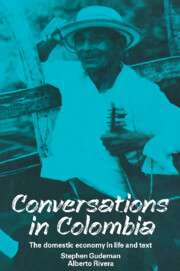2 - THE STRENGTH OF THE EARTH
Published online by Cambridge University Press: 03 October 2009
Summary
The earth and its products are the basis of the rural economy. “Without land, you have nothing on which to live,” one man said, implying that both the earth and its fruits are the means for human survival. Commented another, “All value comes from the earth,” and though the word “value” is infrequently heard, the sense of his statement is common. But for the rural folk the earth is not simply a material resource, to be used or neglected; it is the repository of the “strength” or “force” (la fuerza) that is drawn upon in agriculture and contained in a harvest: “Everything produced from the earth gives strength,” as one person expressed it. Transmitted to the body by food crops, strength is expended by humans in helping the land to “give” more crops and provide more force to maintain the house. The strength of the earth itself, however, was created and is sustained by the divinity, and therefore the success and worth of human endeavors are also reflections of this other power. In the words of a discussant, “One lives from the earth and the will of God.”
We think that this finding – that the house economy is naturally based and divinely underwritten – applies not only to the Colombian countryside but also to other areas of Latin America, for it is the product of a conversation once dominant in the Old World and brought to the Americas with the conquest.
- Type
- Chapter
- Information
- Conversations in ColombiaThe Domestic Economy in Life and Text, pp. 18 - 38Publisher: Cambridge University PressPrint publication year: 1990



